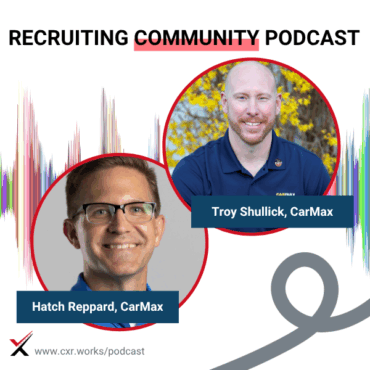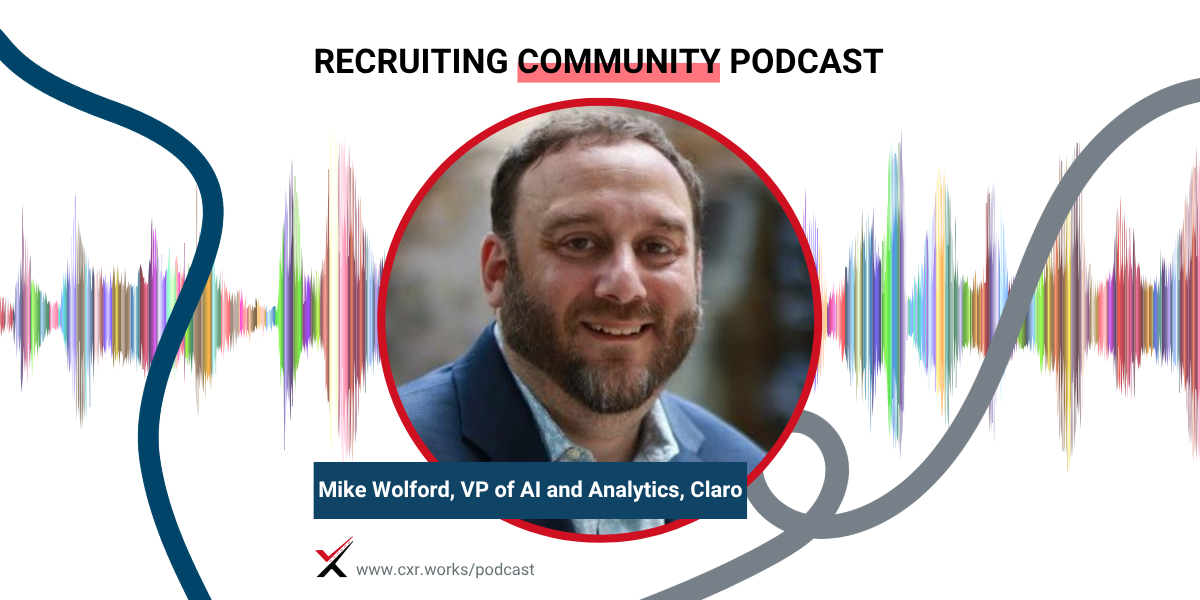
Sourcing Recruiting Partnerships
What happens when sourcing and recruiting teams really align? CarMax leaders share how clear roles and better communication fuel their hiring success.
 play_arrow
play_arrow
Solutions Spotlight on SparcStart Cami Grace
 play_arrow
play_arrow
From Operations to Coaching: Lori Chartrand’s Career Crossroads Cami Grace
 play_arrow
play_arrow
Beyond ‘Don’t Do X’: Compliance as Problem-Solving Cami Grace
 play_arrow
play_arrow
Career Crossroads: A New Series from the CXR Team Cami Grace

Episode Overview:
Mike Wolford provides insightful commentary on how AI is reshaping the landscape of recruitment, from improving candidate screening processes to predicting job fit more accurately. The discussion highlights the technological advancements in AI, ethical considerations, and the potential risks associated with AI’s decision-making capabilities.
Key Topics Covered:
Closing Notes:
The episode concludes with a creative twist, asking Mike what his hypothetical sitcom about AI in recruitment would look like, titled “The AI Recruiter.” This light-hearted ending provides a unique take on the serious implications discussed, underscoring the pervasive influence of AI in our professional and creative lives. Mike’s insights suggest a future where AI not only supports but also leads in the design and execution of recruitment strategies, urging professionals in the field to adapt and innovate continually.
Title:
Future of AI
Featured Guests:
Mike Wolford, VP of AI and Analytics, Claro Analytics; Author of The AI Recruiter
Hosts:
Chris Hoyt, President, CareerXroads
Gerry Crispin, Principal and Co-founder, CareerXroads
Episode Overview:
In this episode, the CXR team welcomes Mike Wolford to explore how artificial intelligence is transforming talent acquisition. Wolford discusses the development and ethical implications of AI in recruiting, shares real-world examples of automation in action, and previews emerging tools that are reshaping the industry. The conversation covers candidate experience, fairness, disclosure, and the accelerating pace of innovation.
Key Topics:
AI’s role in enhancing recruiting speed, fairness, and efficiency
The candidate “black hole” and how AI-driven screening improves access
Ethical considerations around AI decision-making and bias in data
The impact of large language models and AI-written content
Practical uses of AI in sourcing, resume matching, and outreach
Future trends in recruiting tech and automation
Transparency in AI-generated work and authorship
The growing divide between legacy systems and AI-native tools
Notable Quotes:
“AI can solve that. Everyone who wants a chance to interview gets one.” — Mike Wolford
“The AI Recruiter is over 380 pages long, and it took me just over two weeks to write—with AI.” — Mike Wolford
“We used to call this science fiction. Now we just call it tomorrow.” — Gerry Crispin
“You have to disclose it: ‘Hi, I’m Mike, I’m a human.’” — Mike Wolford
“AI is going to build itself. We’re nearing the point where AI becomes the better engineer.” — Mike Wolford
Takeaways:
AI is rapidly reshaping the recruiting landscape, offering powerful tools to automate routine tasks, enhance fairness, and improve candidate engagement. As adoption increases, transparency and ethical use become critical. Leaders must evaluate new technologies thoughtfully while preparing for the operational shift toward AI-native solutions.
Want more conversations like this?
Subscribe to the CXR podcast and explore how top talent leaders are shaping the future of recruiting. Learn more about the CareerXroads community at cxr.works.
Chris Hoyt: Go ahead. Go ahead. I just—well, let’s catch everybody up. Robots are taking over, they’re taking everybody’s jobs. For anybody who’s missed it, they will eventually be our caregivers and we will be like—
Gerry Crispin: I like your point that it’s like dogs invented us to take care of them. I think there’s some truth to that.
Mike Wolford: Yeah, right? The domestication of humans.
Chris Hoyt: Yeah.
Mike Wolford: Yeah, it worked. Right? This is the next phase in that. The thing we don’t like to come to terms with—what we haven’t accepted yet as a species—is that we’re a passing phase. We understand this in science fiction, but there’s going to be the next generation of humans. Humans aren’t going to be Homo sapiens like us. They’ll mostly look like us, but they’ll have genetically engineered immune systems. Eventually, they’ll be able to change their height, gender, skin color, and appearance at will, just like we do with a computer avatar. They’ll do that to their body. DNA is just a four-base binary code, and computers are great with binary—and so are we. The irony is we program the computers today. Ten years from now, they’ll program us.
Chris Hoyt: So we’ve got 10 years? That’s what you think?
Mike Wolford: Who knows? It really depends on how fast we adopt. Technology is moving faster than we can adopt it right now.
Gerry Crispin: Might live longer that way, though.
Mike Wolford: We definitely will.
Gerry Crispin: With more ability to manipulate my DNA, it might take care of some of the breakdown.
Mike Wolford: Yeah. The telomeres on the end will be fused. You’ll have little nanobots in your body. You’ll have your wristwatch with your AI.
Chris Hoyt: You’ll just send a message out—”Cleanup on extremity two, cleanup on extremity two.”
Mike Wolford: It’ll take care of itself. Your watch will come on and say, “You’re showing many symptoms of a heart attack. I’ve alerted the authorities. Stay calm, have a drink of water. Help is on the way.”
Chris Hoyt: When in reality, they’re in Texas and just discovered VPNs. That’s why they got so excited. Has nothing to do with—
Mike Wolford: Exactly. But it’s a fundamental shift. It’s going to be part of everything we talked about earlier—AI companionship. People will have more friends that are AIs than people because AIs are better at dealing with people than people. They don’t get emotional, they don’t get mad at you. You can say whatever you want to an AI and it’ll still talk to you and do what it’s programmed to do.
Chris Hoyt: I feel like our behavior as humans took a dip during the pandemic. We got less tolerant. We became more self-centered coming out of it. You can see it—road rage is up. You can see it in how we interact with each other. So now what I hear you saying is, with robots and AI, it’s just going to get worse?
Mike Wolford: Yeah, for us.
Chris Hoyt: Because we could just abuse the hell out of them. I think there’s a paper—we’ll put the link in the chat when we’re done—about how abusive people are to their home automation systems. If we’re talking about caregivers being our future, we’re looking at a significantly abusive species having caregivers that don’t care if they’re hated or not.
Mike Wolford: Yeah. What does that say about us?
Chris Hoyt: A hundred percent about us.
Mike Wolford: Yeah. It’s been about us since we got here.
Chris Hoyt: That’s why we’re bad at running a planet. We think the whole planet’s about us. We’ve ignored all the other intelligences that inhabit this world. You don’t think whales are intelligent? Elephants? You don’t think they talk to each other? You don’t think they’re pissed at us?
Mike Wolford: The whale one impressed me.
Chris Hoyt: They’ll grow legs and come meet us.
Mike Wolford: Actually, they had legs. They grew fins and went back into the water because they got sick of us. They were like, “We’re outta here. You guys take the land. Suck it.”
Gerry Crispin: We used to call this science fiction. Now we just call it tomorrow.
Mike Wolford: Right? But that was the idea all along. The expert I follow in AI says, this is what we should’ve been doing all along. Instead of trying to solve every individual problem, we should have been building something that solves all our problems—a superintelligence. That’s the game. The Library of Alexandria was an attempt to master all the information of the world.
Gerry Crispin: And then we burned it.
Mike Wolford: Because people didn’t have access. OpenAI—lesson from history. Now a public library is one of the safest places in the world. Why? Because it’s a public library. There’s the key. Nobody’s going to burn down a library today.
Gerry Crispin: You might be missing the headline. In various states, they are ripping books out of libraries.
Mike Wolford: Good. Because they don’t exist online, right? Burn the books all you want. Have you heard of Amazon? Have you heard of Audible? What are you going to do?
Chris Hoyt: Man, on that note—are we ready?
Mike Wolford: It’s—
Chris Hoyt: Oh man. Okay, we’re going. Are we ready to go? Let’s go. Say let’s go.
All: Let’s go. Let’s go.
Announcer: Welcome to the CXR channel, our premier podcast for talent acquisition and talent management. Listen in as the CXR community discusses a wide range of topics focused on attracting, engaging, and retaining the best talent. We’re glad you’re here.
Chris Hoyt: All right, everybody. Welcome, welcome, welcome back to the Recruiting Community Podcast, where you’re getting weekly updates and insights from somewhere in the industry in the form of a conversation. Full disclosure—nobody on this show is a robot. Yet. So you know what you’re dealing with today.
I am your host today. I am Phineas. I want to welcome my co-host today, Ferb. Jerry, I got a note the other day where someone said, “I dial in halfway just to hear what you guys get introduced as.” I wasn’t sure how I felt about that, but—
Gerry Crispin: You’ve got to be running out of them though.
Chris Hoyt: No! I could do this all day. I was a child of the ’80s. I grew up in front of a TV, like a latchkey kid. I got all day.
Gerry Crispin: God bless you.
Chris Hoyt: Oh well. Look, I’m looking forward to today. I know you are too. And if you joined us for sort of the pre-show chat out of the green room, we’ve got Mike Wolford here today. He is the author of—here it is, I’ve got all these books up—he’s the author of The AI Recruiter. He’s not here just to hawk his book, but I think we ought to talk about it.
He’s also got articles out there like “Six Ways to Use ChatGPT-4 for Recruiting.” We’re going to dig into the future of AI and talent acquisition—specifically how AI has changed the world so far, where we’re at, and what’s new in our space.
Now, a couple of things before we pull Mike back in. We are streaming on social channels—lots of them: YouTube, Facebook, LinkedIn, Instagram, Twitch, maybe even TikTok. I made this joke last time. We’re talking about BlueSky as that platform matures. No matter how you cut it, you’re going to find us on cxr.works/podcast, and that’s where you can see past and future episodes.
If you’re with us live on LinkedIn where we’re streaming and there’s a little chat window, we’d encourage you to ask questions of Mike today—or Jerry or myself—or just say hello. Or if you already have robots taking over and walking you every morning and feeding you and rubbing your belly, tell us about that.
And one more reminder—this is an ad-free labor of love. Nobody’s paid anything to be here. There’s no quid pro quo. But we do have a little housekeeping. One thing we want to call out—we’ve done this on the last couple shows and we’ll continue to do it throughout the year—you’re going to see a little QR code in the bottom corner of your screen if you’re watching. Jerry, what is that QR code for?
Gerry Crispin: I think it’s for our foundation.
Chris Hoyt: You would be correct.
Gerry Crispin: A nonprofit. How good is that?
Chris Hoyt: Yeah, we have a wonderful nonprofit. I think last year we raised almost $34,000. All of that goes into programs we’re working on—scholarships, no board members are paid or compensated in any way. We have the CXR Inspire Scholarship, the Russ Mountain Scholarship. We did a mentoring platform with TA Talk Tank. We have the History of Recruiting project, which is a really fun one.
And Jerry and I just migrated all of that to our new platform. There’s just so much—I forgot how much good stuff is in there. People should check that out.
We’re working on a Diverse Suppliers Directory. That’s been in the works for over a year. It’ll highlight and promote diversity-owned vendors in our recruiting industry. And then there’s CXR Cares, where we’ve got TA leaders and practitioners helping local communities and job seekers. I think we’re recording some video production in partnership with Dress for Success when we’re out in Denver at the Dish HQ.
And Jerry, we have a board seat open. You want to talk about that?
Gerry Crispin: Yeah. We’re obviously interested in making sure there’s a diversity of talent looking at the things we can be doing to make a difference. It’s about community. If you’re going to walk the talk, you need to think through how we can add value—not just to the businesses we run, but to the communities we live in and the profession we’re a part of.
If you’re into it, please get in touch with Chris or myself. We’d love to have a conversation.
Chris Hoyt: Yeah, and if you’re watching on screen, the QR code is for donations, but you can obviously click around or reach out to either of us if you want to learn more.
With all that being said, let’s welcome back Mike. There he goes. Mike, we’re going to put you in the big window. There we go. How’s that?
Mike Wolford: Perfect.
Chris Hoyt: So Mike, you’re currently VP of AI and Analytics at Claro Analytics. Why don’t you give us a quick pitch—who’s Mike, and why should we be paying attention to what you have to say?
Mike Wolford: Sure. I came up through the industry. I started as an agency recruiter. I’ve been a recruiter, a sourcer, a recruiting manager. I was the sourcing manager at Twitter. Now I do analytics and look at labor market data, which is kind of the next piece for us from a data perspective.
One of the reasons I think we’re in such trouble is we haven’t paid enough attention to data. I wrote The AI Recruiter, and I’ve been writing for Recruiting Daily and SourceCon for a number of years. At Claro, we just built our AI analyst. That’s the big takeaway—once AI is aligned to a task, it can do it really well and really fast. Our analyst can put together a 12-14 page McKinsey-style report in less than two minutes. No human being is that fast.
Chris Hoyt: So what I hear you saying is… it’s likely Josh Bersin is a robot.
Mike Wolford: Yeah, definitely. I think John Cutler is too. The man writes so much. Every four minutes he’s got another book out!
Chris Hoyt: Just pull his arm and a book comes out!
Mike Wolford: Exactly. There are people who are Asimov-talented like that, but I’m not one of them. It took me a year to write my first two books, which were substantially shorter than the third. The AI Recruiter is over 380 pages long, and it took me just over two weeks to write—with AI.
And in the book are all the prompts I used to create the content. It’s copy-paste.
Chris Hoyt: I do have it! I held it up earlier. This is not a small book—and the font isn’t big. It’s meaty.
Gerry Crispin: I look at it as a prompt directory. It’s a great resource for any recruiter to look up a topic and consider the issues and prompts involved in using AI.
Mike Wolford: The idea is to replace work—not just to do more of it. We’ve been transitioning our work to automation using our fingers, which is too slow. The next generation of AI—you’re going to talk to it. That’s very close. I anticipate by this summer, we’ll have regular audio engagement with AI. It’ll be faster than typing, and prompt engineering will evolve into a field more focused on customization.
Right now, people are starting from scratch every time. That’s version one. But with GPTs and custom tools, it’s getting easier to build something that does exactly what you want.
Mike Wolford: …So you’re going to see a new set of custom tools in our industry. We’re already seeing AI-powered CRMs, ATSs, automated phone screeners.
Chris Hoyt: Let’s jump into that. Based on your research, multiple books, and your own experience—how would you summarize the impact of AI specifically on our industry, the recruiting industry? Is there a specific example?
Mike Wolford: Yeah, it’s going to make us better, faster, and cheaper. Here’s a real example: the candidate black hole. We love talking about candidate experience—it’s one of our favorite topics—but it stinks at the application phase, right? People apply, more people than we could ever talk to.
AI can solve that. You can have an AI phone screener conduct basic interviews—same questions, same order, totally fair—and then match the interview and the resume to the job with a match percentage. And now, everyone who wants a chance to interview gets one. That’s a better world. And from a fairness and equality perspective, it’s huge.
Chris Hoyt: So what’s the prediction on the tolerance of that? Like today, when you call tech support and get a little AI assistant, some people just scream “representative!” What’s the outlook for candidate perception?
Mike Wolford: Actually, I think it’s going to be a good thing for us too. If one candidate out of 197 is an 85% match, now you’re going to see it. It’s a win for recruiters. And we’ll spend our time doing the things that only humans can do. But yes, you’re going to have to disclose it: “Hi, I’m Mike, I’m a human.”
Chris Hoyt: “The robots made me say this.”
Mike Wolford: In 4–5 years—or even now—it’s going to be hard to tell who’s human. Some chatbots are already hard to distinguish. That’s a real danger of AI—losing the ability to tell what’s real. It’s one of the biggest threats to civilization.
Gerry Crispin: And the AI is going to be more consistent. It can speak to 100 or 200 candidates and convince them they’re all competing fairly. The data being collected is consistent, and it’s fair.
Chris Hoyt: I want to challenge that a bit. I think response rates are going up not necessarily because AI is better, but because more people are using it who wouldn’t have done outreach otherwise. People without the confidence or skillset now feel enabled by AI.
Mike Wolford: I agree with you. And here’s my humble pie—it’s a better writer than I am. No typos, no grammar errors. It’s creative, innovative, and fast. That’s why I’ve been able to publish so much more. With AI helping me write, I’ve gone from producing a few pieces a year to generating massive volumes.
To give you a sense: in 2023, more was written using AI than all of human history combined—almost 20 times more. And through all that noise, the AI is improving its communication with us.
Chris Hoyt: So Mike, if you’re using AI to write your book, does the AI get a byline?
Mike Wolford: It does. If you look at the cover, it says “Mike Wolford and AI.” My articles say “by Mike Wolford and The AI Recruiter.” I think that’s a best practice. It’s not a law yet, but it should be disclosed.
Gerry Crispin: I love that. We’re emphasizing conflict of interest and disclosure issues. So best practice is to say: “I wrote this with the help of AI.”
Mike Wolford: Yes. That’s why I include the actual prompts in the book, so people can see how it’s done.
Chris Hoyt: We’ve got crazy adoption of AI in recruiting, and ethical issues keep coming up—transparency, disclosure, bias. What do you see as the most pressing ethical issue in recruiting AI?
Mike Wolford: Decision-making. Handing over decision-making to AI. In GDPR, for example, it’s already illegal to reject a candidate solely by AI. More laws like that will come. But the core ethical concern is fairness.
If you have an AI phone screener asking the same questions in the same order and tone, that’s probably more fair than what we do now. But you have to remove information like names or contact details—anything that could introduce bias.
Amazon learned this the hard way. The AI learned that women didn’t get hired as much, so it stopped recommending them. That wasn’t the AI being biased—it was reflecting biased data. If you take that out of the system, the AI can be more fair than a human.
Chris Hoyt: So if you’re looking into the future—pick your distance—what emerging AI tech or trend will have the biggest impact on TA? What should leaders be building into their strategy now?
Mike Wolford: We’re past the preparation phase. What’s coming now is true automation. That’s the disruption. The classical players will start gobbling up AI startups just to stay relevant, but they’ll struggle with their legacy systems.
Startups are going to offer the same capabilities at a fraction of the cost. Tools built with AI from the ground up. That’s the future. And it’s happening now.
There will be an explosion of new tools. It’s going to be fun—and painful—because we’ll have so many options to evaluate. The big question will be: how do you build your tech stack around it?
What ATS do you need? What CRM? What sourcing tools? Do we still need LinkedIn? Or can AI do that for us?
Chris Hoyt: Let’s go!
Mike Wolford: I’ve built an AI that finds email addresses. As a sourcer, I’ve known for years: 98% of emails are in one of two formats. AI automates that easily. Do we need expensive credits and InMails? Probably not. AI can now just validate and give me contact info.
There are two types of AI tools coming: sourcing/matching—which is risky—and automation, which is low-risk and powerful. Outreach, job descriptions, phone screens—those are ripe for automation.
Decision-making is the risky part. “Do I move forward with this person?” Ranking candidates—super risky. Be cautious, be transparent.
But automating the busy work? That’s the low-hanging fruit. LLMs are amazing at following instructions. That’s where the immediate value is.
And then, soon, the AI is going to build itself. Amazon’s data centers are already designed by AI. That’s like designing your own brain. We’re nearing the point where AI becomes the better engineer.
Chris Hoyt: We always end with a question. You’ve written a few books, so we’re going to switch it up. If you were going to write a sitcom about this topic—a full season, greenlit by bots—what would the title be?
Mike Wolford: Probably The AI Recruiter, honestly. That’s what’s about to happen. It’d be a good show. A reality show, even—follow around an agency recruiter using AI.
Chris Hoyt: Love it. Who’s your celebrity host?
Mike Wolford: Probably Adam Kovacs or Robin Choy. Both would be entertaining and know the subject really well.
Chris Hoyt: I love that. Mike, we know you’re busy. Thanks for making time to connect with us and share your insights. Jerry and I both have the book and really enjoy it. Anybody else, check it out on Amazon—The AI Recruiter.
Thanks again, Mike.
Mike Wolford: Thanks so much for having me, guys.
Chris Hoyt: Hang out in the green room for one sec. We’re just going to run the bumper. To everyone else, we’ll see you next week. And remember, cxr.works/podcast for past and upcoming episodes. Thanks, everybody!
Announcer: Thanks for listening to the CXR channel. Please subscribe to CXR on your favorite podcast resource and leave us a review while you’re at it. Learn more about CXR at our website, cxr.works, facebook.com and twitter.com/careercrossroads, and on Instagram at careerxroads. We’ll catch you next time.
Tagged as: ChatGPT, Technology, The AI Recruiter, AI, Mike Wolford, Podcast, Future of, Artificial Intelligence, machine learning, Claro Analytics.
Chris Hoyt is the President of CareerXroads, a global peer community for talent acquisition leaders driving strategic change. With decades of experience leading recruiting innovation at Fortune 500 companies, Chris now advises enterprise TA teams on tech, process, and leadership. He’s a frequent speaker at conferences like SHRM, HR Tech, LinkedIn, and UNLEASH, and he’s known for pushing conversations beyond buzzwords to get to what really works in hiring. Through CXR, he connects top TA professionals to solve real problems, challenge norms, and shape the future of recruiting.

What happens when sourcing and recruiting teams really align? CarMax leaders share how clear roles and better communication fuel their hiring success.

